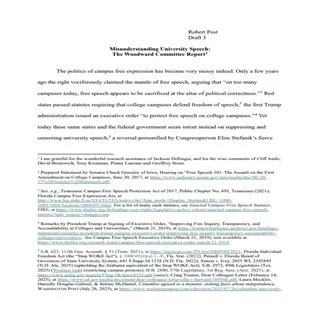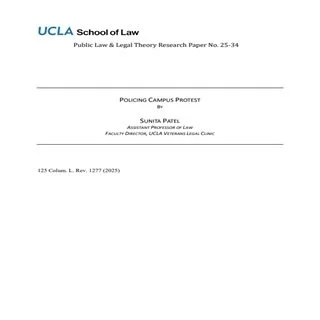By Apratim Vidyarthi
Academic freedom is an essential principle undergirding education in the United States. Its purpose is to further the freedom of thought and inquiry in the academic profession by advancing knowledge and the search for truth. Academic freedom goes back more than a century, and is now intertwined with First Amendment doctrine. Yet today’s academic freedom doctrine suffers from serious problems, some of which perpetuate discrimination in the classroom and systemically in educational institutions. The definition of academic freedom in theory is misaligned with that in case law. Courts have done little to analyze what protections academic freedom provides, and case law generally provides too much protection in some cases, and too little in others. Worse, academic freedom for universities and professors has been hotly debated and thus well-defined and protected in case law, whereas students’ academic freedom has received less attention, making it a “second-tier” academic freedom. Often, protecting university and professors’ academic freedom comes at the expense of students’ academic freedom, though courts have never truly struggled with multistakeholder academic freedom questions or tried to create a clear process to determine whose academic freedom prevails when the two conflict. This results in academic freedom being used as a sword to promote discriminatory behavior, and as a shield to protect acts of discrimination from being punished. Existing constitutional and statutory antidiscrimination protections do not provide adequate support against discrimination, especially for students’ academic freedom. Constitutional protections for students’ academic freedom often take the back seat to free speech doctrine, and antidiscrimination protections are often parried by using academic freedom to protect problematic behavior. A few solutions abound: first, the definition of academic freedom is nearly a century old, and needs to be redefined to incorporate antidiscrimination principles to be relevant for the present. Second, students’ academic freedom rights need to be understood and defined more clearly. Third, courts must find a way to balance competing stakeholders’ academic freedom interests, ultimately looking to the purpose of academic freedom to advance knowledge. Finally, universities must play their part by creating systems and structures to ensure that discrimination is remedied as early as possible, and that university processes help clarify the extent of academic freedom definitions and support application of antidiscrimination law.
JOURNAL OF CONSTITUTIONAL LAW [Vol. 26:2, 2024. . 79p.




